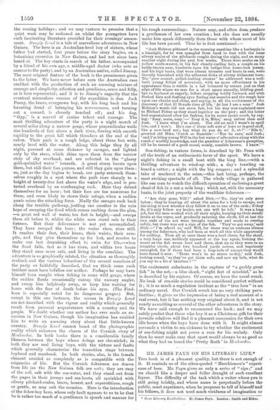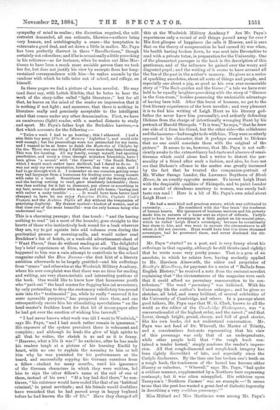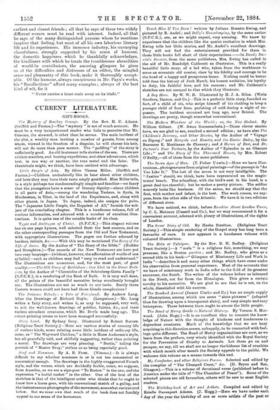MR. JAMES PAYN ON HIS LITERARY LIFE.*
Tins book is of a pleasant quality, but there is not enough of it. It reminds us of the often-quoted " Marchioness's " experi-
ence of beer. Mr. Payn gives us only a series of "sips ;" and we should like a deeper and fuller draught of such excellent liquor. The difficulty of the task which a writer whose pen is still going briskly, and whose name is perpetually before the public, must experience, when he proposes to tell of himself and his fellows, it does not need much vividness of imagination or
* Sorer Literary Recollections. By James Pawn. London : Smith and Elder.
sympathy of mind to realise ; the discretion required, the self- restraint demanded, all can estimate, likewise—authors being very human, and autobiography a snare—the temptation to extenuate a good deal, and set down a little in malice. Mr. Payn has been perfectly discreet in these "Recollections," though certainly not colourless; and if he is occasionally a little provoking in his reticence—as for instance, when he makes out Miss Mar- tineau to have been a much more amiable person than we took her for, but does not justify his view by excerpts from her long- sustained correspondence with him—he makes amends by the candour with which he tells tales out of school, and college, on himself.
In these pages we find a picture of a born novelist. He may (and does) say, with Leitch Ritchie, that he hates to hear the work of the story-teller called "light literature ;" but for all that, he leaves on the mind of the reader an impression that it is nothing if not light ; and moreover, that there is nothing in • literature really and genuinely acceptable to the intelligent mind that comes under any other denomination. First, we have an omnivorous (light) reader, with a marked distaste to study and sport. Mr. Payn's father kept the Berkshire harriers,—a fact which accounts for the following :—
"Twice a week I had to go hunting ; this I abhorred. I had a nice little bay pony (Flash of Memory 'Lightfoot'), and could ride well enough;- but the proceedings were too protracted for my taste, and I wanted to be at home to finish the Mysteries of Udolpho by the fire. There was one thing I disliked even more than hare-hunting. This was fox-hunting. All my family, except myself, had sporting proclivities, and many a time, through mistaken friendship, have I been given ' a mount' with the Craven' or the South Barks,' which I would much rather have declined, had I dared to do so. It was not only my own reputation, however, that was at stake, and I had to go through with it. I remember on one occasion getting some very bad language from a huntsman for feeding some young hounds with cake in a wood. Sometimes the cold and the waiting about, and the having nothing to read, grew absolutely intolerable ; there was then nothing for it but to dismount, put clover or something in my hair, smear my shoulder with mould, and ride home, having met with rather a nasty tumble.' . . . . It would have been better (and cheaper) to have let me enjoy Peregrine Pickle, Captain Coolc's Voyages, and the Arabian Nights all day without the temptation of practisiug duplicity. My dearest mother—kindest of women, and at that time one of the most beautiful—was the only human being who understood me."
This is a charming passage ; that fine touch : 1` and the having nothing to read" (at a meet of the hounds), goes straight to the hearts of those who instinctively look round for a book wherever they are, try to get squints into odd volumes even during the penitential process of morning-calls, and would rather read
Bradshaw's list of hotels, or a week-old advertisement-sheet of "Want Places," than do without reading. at all. The delightful boy's brief experiences at Eton, where the cruellest thing that happened to him was a vain attempt to contribute to the school magazine called the Eton Bureau—the first hint of a literary ambition afterwards to be largely gratified—and his sufferings from "crams" and otherwise at the Woolwich Military Academy, where his sore complaint was that there was no time for reading and writing, are very characteristic and interesting portions of the book. One would like to know how that humorous youth who " paid-out " the head master for flogging him (at seventeen), by only pretending to drop the customary valedictory ten-pound note into the "testimonial" jar, while he really "reserved it for more agreeable purposes," has prospered since then, and one retrospectively envies him his stimulating speculations "on the head master's fruitless hunt for that bit of tissue-paper after he had got over the emotion of wishing him farewell."
"I had never known what work was till I went to Woolwich," says Mr. Payn, "and I had much rather remain in ignorance." His exposure of the system prevalent there is vehement and complete ; and although he lends the glow of high spirits to -all that he writes, the sketch is as sad as it is funny.
"Heavens, what a life it was I" he exclaims, after he has made his readers laugh at a picture of his learning Euclid by heart, with no one to explain the meaning to him or tell him why he was punished for his performances at the board, and successfully copying his German exercises from a. fellow - student for many months, until his ignorance of the German characters in which they were written, led him to sign the other fellow's name at the end of one of them, instead of his Own! "If a boy had died there," he con- tinues, "his existence would have ended like that of an 'habitual criminal,' in penal servitude ; and his friends would doubtless lave remarked that he had passed away in happy boyhood before he had known the ills of life." Have they changed all this at the Woolwich Military Academy ? Are Mr. Payn's experiences only a record of evil things passed away for ever ? His first glimpse of happiness (he calls it Heaven, and is sure that on the theory of compensation he had earned it) was when, his health having broken down, he was sent into Devonshire to read with a private tutor, in preparation for the University. One of the pleasantest passages in the book is the description of this gentleman, and of the influence he gained over the weary and disgusted pupil ; and the writing of it seems to have aroused all the fun of the past in the author's memory. He gives us a series of sparkling anecdotes, about all sorts of things and people, and especially one about a pig, as good as his own ever-memorable story of "The Back-garden and the Goose ;" a tale we have ever held to be equally laughter-provoking with the story of "Grouse in the Gan-room," besides possessing the undeniable advantage of having been told. After this burst of humour, we get to the first literary experiences of the born novelist ; and very pleasant it is to find him writing of Leigh Hunt as his literary god- father (he never knew him personally), and ardently defending Dickens from the charge of intentionally wronging Hunt by his portrait of Harold Skimpole. "It is true," he says," that he drew one aide of it from his friend, but the other side—the selfishness and thebaseness— had nought to do with him. They were so utterly
opposed to his character, that it perhaps- seemed to Dickens that no one could associate them with the original of the
picture." It seems to us, however, that Mr. Payn is not suffi- ciently awake to the extraordinary bad-taste and absence of sensi- tiveness which could alone lead a writer to distort the per- sonality of a friend after such a fashion, and also, he does not see that Dickens's offence in the matter was greatly increased by the fact that he treated the companion-portrait of Mr. Walter Savage Landor, the Lawrence Boythorn of Bleak House, in an exactly opposite manner. To invest Leigh Hunt
with the despicable qualities of Skimpole, and to paint Landor as a model of chivalrous courtesy to women, VMS surely bad- taste run mad ! Here is a bit of Mr. Payn's own mind about Leigh Hunt :— "He had a most kind and gracious nature, which was cultivated to extremity He combined with the 'fine brain' the tenderest of human hearts. His ignorance of business matters and his poverty made him to natures of a baser sort an object of ridicule. Carlyle used to keep three sovereigns in a little packet on his mantel-piece, which he called Leigh Hunt's sovereigns,' because he occasionally lent them to him, and was wont to narrate the circumstance to all whom it did not concern. Hunt would have lent him three thousand sovereigns, had he possessed them, and never disclosed the cir- cumstance."
Mr. Payn " started " as a poet, and is very funny about his sufferings in that capacity, although he still thinks (and rightly) that he wrote some very pretty poems. That is a gem of an anecdote, in which he relates how, having modestly applied
to Mr. Harrison Ainsworth, the editor and proprietor of Bentley's Miscellany, for payment for a series of "Ballads from English History," he received a note from the eminent novelist explaining that "the circumstances of the magazine were such that it could afford no pecuniary remuneration to its con- tributors." The word " pecuniary " was italicised. With his University life the author's horizon enlarges ; and he gives us sketches, all brief, and many brilliant, of several celebrities of the University of Cambridge, and others. In a passage about good talkers, Mr. Payn says that W. G. Clark, known to all the world as the editor of the Cambridge Shakespeare, was "a conversationalist of the highest order, and the rarest ;" and that Lever, though bright, genial, cheery, and full of good stories, like his own books, did not understand conversation. Mr. Payn was not fond of Dr. Whewell, the Master of Trinity, and a conscientious foot-note representing that his view of this personage was only that of an undergraduate, while other people held that "the rough husk con- tained a tender kernel," simply confirms the reader's impres- sion. All that rough-diamond and rough-husk imagery has been rightly discredited of late, and especially since the Carlyle disclosures. By the time one has broken one's teeth on a rough husk, the tenderness of the kernel has become either illusory or valueless. " Whewell," says Mr. Payn, "had quite a sublime manner, snpplemented by a Northern burr expressing contempt ; but it was often misapplied. His criticism upon Tennyson's Northern Farmer was an example It seems tome that the poet has wasted a great deal of dialectic ingenuity in describing a very toothless pussonage.'" Miss Mitford and Miss Martineau were among Mr. Payn's
earliest and closest friends ; all that he says of these two widely different women must be read with interest. Indeed, all that he says of the many distinguished persons whom he mentions inspires that feeling, but most of all his own laborious literary life and its experiences. His immense industry, his-unvarying cheerfulness, strongly supported by his sense of humour, the domestic happiness which he thankfully acknowledges, the kindliness with which he treats the troublesome absurdities of would-be contributors, the amusing glimpses he gives us of the difficulties and distresses of an editor, the mingled sense and pleasantry of this book, make it thoroughly accept- able. Of the humour, always conspicuous in Mr. Payn's works, his "Recollections" afford many examples ; always of the best kind of wit, for it "Never carries a heart-stain away on its blade."




































 Previous page
Previous page